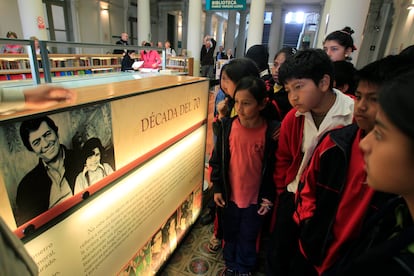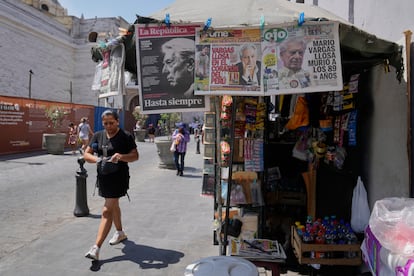The morning mist wrapped the scratches perched on the coastal hills of Lima on Monday. The surfers rode on the brave waves of the Pacific while inland those who have to work from sun to sun to earn sustenance patiently waited in kilometer rows to take a bus that would advance to a turtle step in the infernal traffic of the Peruvian capital. At first glance, any day, but Peru dawned on Monday without the most illustrious and universal among his children, Mario Vargas Llosa, who died on Sunday surrounded by his and in peace at the age of 89. His country has fired him with a day of national mourning and the red and -white flag at half -mast by decree. No other institutional gesture, in respect of your desire. The Nobel wanted an intimate farewell, without public tributes.
“When I knew he died, I felt that an era is over for Peru,” explains the Peruvian painter Rember Yahuarcani. “A universal era ends because I don’t think we have another Nobel in 50 or 100 years,” adds this painter who, among his compatriot’s work, chooses as his favorite Lituma in the Andes. “His political opinions have always divided Peru,” he says. “Judging it from that political perspective is fine, but let’s not forget that it is one of the greatest” of universal literature.
Peruvians separate Vargas Llosa writer from Vargas Llosa political. While with exquisite thoroughness built novels, he tried to reach the Presidency of the Republic in 1990 and fell defeated before Alberto Fujimori, on whose authoritarianism he warned soon. And always participated from close and from afar in all the great national and international debates.
The President of the Republic, Dina Ercilia Boluarte Zegarra, and the Government of Peru deeply lament the death of Mario Vargas Llosa, universal writer and distinguished Nobel Prize for Literature. His intellectual genius and his vast work will remain as a legacy …
– Presidency of Peru 🇵🇪 (@presidenciaPeru) April 14, 2025
To the first, the author, the Peruvians consider him the genius with an unquestionable talent that led his country to the greatest glories with the Nobel or his entry into the French Academy, the first Latin American writer and without creating in French. For decades it was one of Peru’s great ambassadors, still analyzing the national soul with a critical eye. In 2023, just one month after the historic Parisian ceremony, Peru granted him his highest award, the Order of the Sun. He received that honor with controversy, because it was from President Dina Boluarte, very questioned by the repression of protests and several corruption scandals. After the announcement of his death, Boluarte said in X that “his intellectual genius and his vast work will remain as an imperishable legacy for future generations” before wishing him: “Rest in peace, Peruvian illustrious of all time.”
Vargas Llosa and his work have been erected for many decades as one of Peru’s main hallmarks before the rest of the world. Next to him, the majestic Inca city of Machu Picchu and Peruvian cuisine with the ceviche as a banner. After that international image, a country that still does not find its course. He lives as a crisis in a crisis without respite and is corroded by a polarization and an extreme discredit of the political class.
The retired secretary Ivonne Gehri admires him “because he was an authentically free man, without thinking about what they will say or the controversies that his positions could cause. We love him, others hated him,” he says. Choose THE WAR OF THE END OF THE WORLDbut he adds that he needs to reread that and others of his books because some characters have blurred over the years.
In his press kiosk in a noble zone in Lima, Isabel Coello, 79, “ten less than him,” praises the writer for his vast work, for having helped “without envy” Alfredo Bryce Echenique in his career, but also because he managed to reach the end of his days with autonomy. “He has not died in the frustrated bed, but walking through Lima, writing.” But what Coello admires most about his illustrious compatriot is his ability to recognize his mistakes. “Here in politics he supported the good already the bad people trusting every time they could take Peru forward. And when it corresponds, he recognizes his mistakes; he is a wonderful, very noble man,” he says after the counter where the first pages of the most serious newspapers, and some popular, are dedicated entirely to different black and white versions of the Vargas Llos of always, elegant and with that serene look. Among Nobel’s novels he chooses The goat party.

Several joints emphasize that, faithful to their principles and their radical defense of freedom and democracy, Vargas Llosa was evolving in their political positions. In 2021, he asked for the vote for Keiko Fujimori, the autocrat’s daughter, in front of Professor Pedro Castillo, who raised the peasantry enthusiasm and finished his presidential mandate with a coup attempt against himself.
The newspaper of the newspaper Commerce It stands out about Vargas Llosa that, “while working as a artisan of the word, he took care of using it as a weapon in the fight of ideas … and that is a lot to say in a historical trance in which leaders and ideas scarce.” For the editorialist of The Republic“He bequeathed an existential question that Peruvians could not answer: ‘At what time had Peru fucked?’ (Conversation in the cathedral1969). ”And remember that until his last book, I dedicate my silence (2023), the writer “did not stop finding a solution to the question that describes the constant historical anxiety of Peruvians regarding their future.”
Both the artist Yahuarcani and the Quiosquera Coello appreciate that the Hispanic-Peruvian chose to finish his days in his homeland. Surrounded by several copies of the Hello!the press saleswoman points out the reason she thinks she decided to settle in Lima after her break with Isabel Preysler: “I had to live anywhere, but I believe that he needed the affection of the family,” including the mother of her children, the cousin Patricia, “who helped her so much in her facet as a writer.”
Yahuarcani emphasizes that the novins of the Nobel Prize for literature in recent months through the Historic Center of Lima to revisit the stages of his novels “have broken a barrier, they have approached the people and made us participate in what Vargas Llosa means to the world.”

